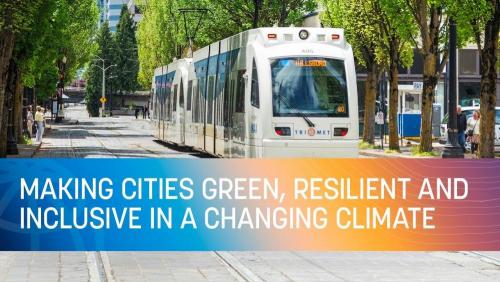Cities, as engines of prosperity, are major contributors to climate change, generating about 70% of global greenhouse gas emissions. At the same time, as home to more than half of humanity, cities are on the front lines of climate change.
Main Messages
Globally, about 70 percent of anthropogenic greenhouse gas (GHG) emissions, most of which are carbon dioxide (CO2) emissions, come from cities. High- and upper-middle income countries contribute significantly to these emissions. However, cities in lower-income countries, which account for only ~14% of all global urban CO2 emissions, will face most of the climate change-related hazards.
If we are to meet the global target of net zero emissions by 2050, cities in lower-income countries must develop differently from the historic emissions trajectories of cities in higher-income countries. Without innovation and investment in greening these cities, global GHG emissions will remain above the level required to limit global warming to 1.5 degrees Celsius – even if high- and upper-middle-income countries successfully transition to net zero by 2050.
Cities in low- and lower-middle-income countries face the highest projected climate change–related hazards. For these cities, projected exposure for 2030-2040 for six key hazards (floods, heat stress, tropical cyclones, sea-level rise, water stress, and wildfires) is much higher than for cities in higher-income countries.
Cities in low- and lower-middle-income countries are less resilient to increasingly frequent climate change–related shocks and stresses. These cities suffer larger negative economic impacts from extreme weather events than do cities in higher-income countries, especially when these events reinforce a city’s baseline climatic conditions. Lack of inclusiveness contributes to the lack of resilience.
As evidenced by data on PM2.5 (particulate matter of 2.5 microns or less in diameter) concentrations and emissions, cities in low- and middle-income-countries are less green in terms of air pollution, and air pollution from key urban sectors is a greater challenge for larger cities.
Cities that develop vertically consume less land, accommodate more people, and are more prosperous. Across cities globally, a doubling of a city’s total height leads to a 16% increase in its population and a 19% reduction in its land area relative to other cities. This is accompanied by a 4% increase in the intensity of the city’s night-time lights, suggesting increased prosperity.
About Thriving
The report provides recommendations on policy options to help cities reduce their emissions, enhance their resilience to climate shocks, and become more inclusive to keep the poorest populations from feeling the impacts of climate change most acutely. The policy recommendations are based on the “Five Is”: Information, Incentives, Insurance, Integration, Investments.
The report offers insight into how to help cities become greener, more resilient, and more inclusive – in other words, on how to help cities thrive – in a changing climate.











Add new comment